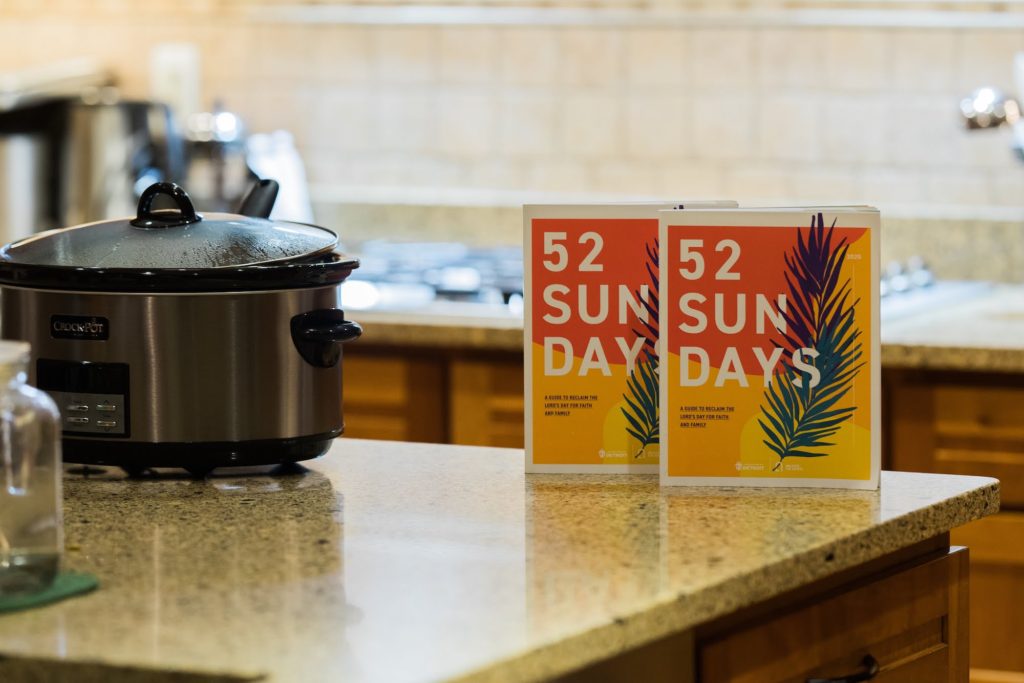
DETROIT (CNS) — There’s no such thing as the perfect Catholic family.
Days of joy, celebration and happiness can be followed by challenges, heartbreak and, at times, chaos brought on by contemporary hectic lifestyles.
At their best, however, Fr. Stephen Pullis, director of evangelization, catechesis and schools for the Archdiocese of Detroit, knows that Catholic families are full of life, love, faith, companionship and hope.
Recognizing everyday reality, the archdiocese has introduced a series of tools geared toward supporting parishes and helping families live their mission as the “domestic church.”

Foremost among those tools is a new program designed by the archdiocese to help families reclaim Sunday as a day for God and for the family.
Called 52 Sundays, the program is a road map for families to live Sundays together in a countercultural, faith-filled way, Fr. Pullis told the 750 people who participated in the archdiocese’s Parish Day of Renewal in November.
Spanning the 2020 calendar year, 52 Sundays includes a resource book and an online component to guide families through weekly exercises based on the Sunday Gospels. It also includes reflections on the saints, a specific prayer activity and a recipe for each week.
“The idea is to take this day that God has consecrated as sacred and to live that as a family,” Fr. Pullis explained to Detroit Catholic, the archdiocese’s online news platform. “We know that looks different for a young adult or a newly married couple, so we really focused on families who have kids at home.”
The material focuses largely on family dialogue, giving families a chance to digest the material together and bounce ideas off each other.
The prevailing culture doesn’t support family togetherness as it once did, let alone earnest conversations about faith, Fr. Pullis said.
“So much of how we learn as a family is in dialogue together. It’s important that we take that time as a family to have that conversation,” Fr. Pullis said. “This is a chance for families to make Sunday a day about the Lord.”
Resources are available in English and Spanish at 52Sundays.com, and all of the material is available to download for free. Families also can follow along with each week’s lessons and activities on the Unleash the Gospel Facebook page.
Given the archdiocese’s decision in 2019 to cease scheduling sporting events on Sundays, Fr. Pullis said it is important for the church to offer an alternative for families to spend time together away from athletic fields or computer screens.
“We knew for a lot of families, sports were an obstacle to living Sunday as a day of rest set apart for God,” Fr. Pullis said. “But there are lots of things that can distract us. It can be hard to think about, ‘Well, what do we do now? Do we just stare at our screens all day? Do we just break off and be isolated in our own little world?’ This takes each Sunday in 2020 and offers a resource to help the family reclaim that day.”

In addition to 52 Sundays, the archdiocese’s Department of Evangelization, Catechesis and Schools has developed numerous resources to strengthen marriage and family life, including new guidelines for marriage preparation.
Parish Day of Renewal also featured training for parish staff and ministers on personal faith sharing, forming and organizing small parish-based groups, and offering “radical hospitality” for parish newcomers.
Oftentimes, the “least hospitable” interactions in a parish take place either in the pews or in the parking lot — where people are most likely to become protective of “their” space, Fr. Pullis said.
On the contrary, “our parishes should be centers where people feel welcome, where we can share the joy and what it means to follow Jesus,” he said.
Small groups are an effective way to do that, especially in larger parishes where it’s impossible for parish staff to effectively minister to each individual.
Parishes must be mindful of the fact that newcomers might only give the parish one chance to make an impression — which means every person serves as a potential ambassador.
“Every parish should be deliberate on how to welcome those who never come to church, who have not been there in years, who may cross the threshold with some trepidation,” Fr. Pullis said. “The parish is really meant to be a leaven for the whole of the community.”
Strong parishes are essential for growing the church, but they’re also critical for strong neighborhood development, Fr. Pullis added.
“We see in a lot of places, especially in the city of Detroit, the difference a parish makes in the neighborhood,” the priest said. “If we’re not ready to be hospitable to those who show up at our door, how can we go out and share the Gospel with people where they are?”
— By Michael Stechschulte, Catholic News Service. Stechschulte is editor-in-chief of Detroit Catholic, the online news platform of the Archdiocese of Detroit.





